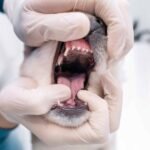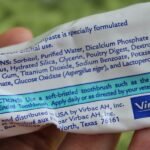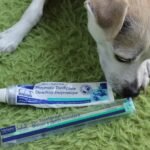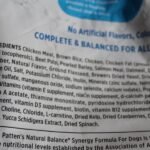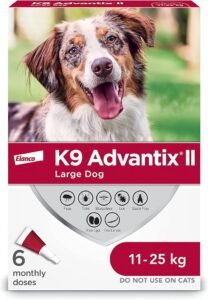Proper dental care is just as important for dogs as it is for humans. Keeping your dog’s teeth clean and plaque-free is essential to their overall health.
Poor dental hygiene can lead to periodontal disease, tooth loss, and even an infection that could cause serious harm to their general condition. A build-up of tartar and bacteria on the teeth and gums allows plaque to turn into hardened calculus, also known as tartar, which irritates the gums, causing inflammation and gingivitis. This can progress to make your dog lose teeth, cause receding gums, and even lead to bone loss around your dog’s tooth roots.
Still, many dog owners don’t even realise that they should brush their dog’s teeth or just how important oral hygiene is for our canine friends. This neglect means that many pets have to experience painful tooth issues and may lose teeth before they even reach middle age.
To help, we’ve put together this list of practical tips on how to keep your dog’s teeth clean and improve their oral hygiene so they can enjoy a happy and healthy life.
Introduce Tooth Brushing From A Young Age
Brushing your dog’s teeth is the main way that you can maintain good oral hygiene for them, and you need to do it regularly to make sure you remove plaque and other debris. Brushing should be done once a day, but if your dog is stressed, then you might need to start slowly and build up to daily brushing. If you get your dog as a puppy, you should introduce them to daily tooth brushing at a young age and help them enjoy having their teeth cleaned. If you have a rescue dog or a nervous pet, then take the time to get them used to having a brush in their mouths. There are also disposable dog tooth wipes available, which can make it easy to wipe away dirt and plaque daily, especially after meals. These products don’t replace brushing but can help keep teeth cleaner and be a useful alternative to brushing initially for those who are desensitising their dogs to having their teeth cleaned.
Choose The Right Dog Food
The meals you feed your dog will have a significant impact on their dental health. Poor-quality foods can cause tartar build-up and plaque. These foods are also bad for your dog’s overall health and wellbeing, which may affect their teeth in the long run. Consider switching your pet to a raw dog food diet from providers like Southend Dog Training, who offer top-quality food that provides natural health benefits. Raw food encourages your dog’s natural instincts to chew and gnaw, so it can be an ideal way to help keep their teeth in good condition.
Provide Dental Chews And Toys
As mentioned, gnawing is a natural instinct for dogs and can help provide stress relief as well as keep their teeth clean. However, your dog may want to chew on things like rocks, bones and sticks, but these can cause tooth fractures and increase tooth wear. To discourage this behaviour, provide safe, softer chew toys that are good for their teeth instead. Also, explore the best dog chews for teeth to give them a delicious treat that will help improve their dental hygiene at the same time.
Visit The Vet If You’re Unsure
If you’re ever in doubt about your dog’s oral health or think there might be something wrong, take them to the vet immediately. They can check your dog’s teeth and general health and let you know if there’s anything to be concerned about. Being proactive will give you the peace of mind that your dog is healthy and help catch any minor tooth problems before they become major medical emergencies.
Wrapping Up
Ultimately, while it might seem like a lot of work, making dental care for your pet a priority offers many benefits for you and them. It will help your four-legged friend avoid unnecessary pain, retain their teeth into old age, improve digestion and eating, and have fresher doggie breath. Also, it can help reduce your vet’s bills, which is always a bonus! So, try these tips today.


